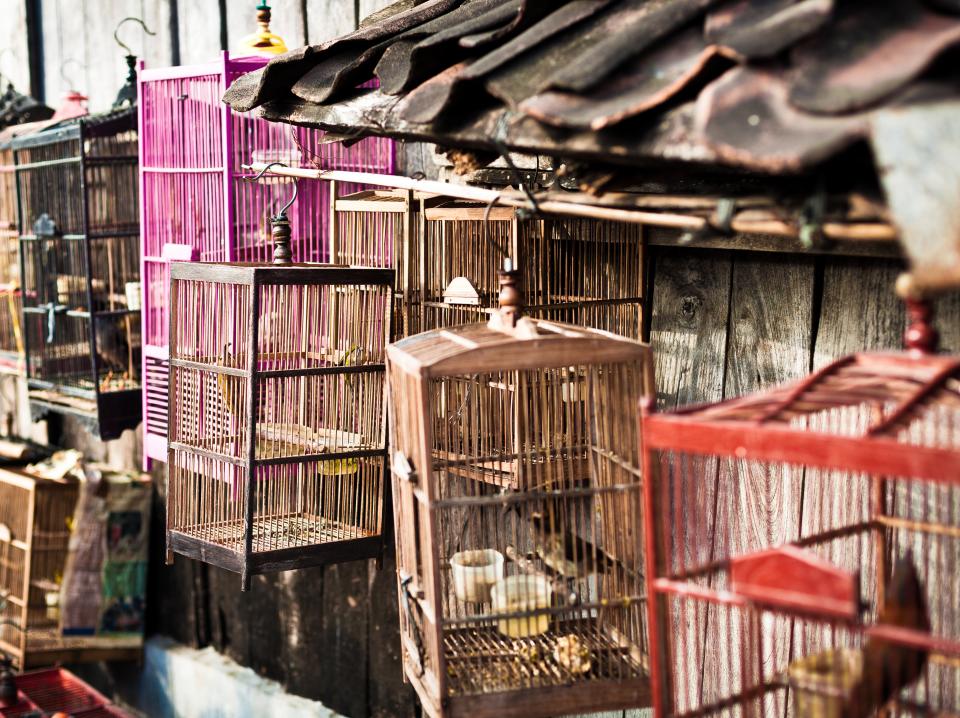Songbird trade in Indonesia causing serious decline in the population of Sunda laughingthrush, study says

Sunda laughingthrushes, which play an important role in ecosystems as a seed disperser, are facing a severe decline in population in Indonesia due to the songbird trade, a study has found.
A market survey of more than 30 cities across the country between December 1991 and February 2020 found a significant drop in the total number of the species that were offered for sale over a period of time.
Published in the European Journal of Wildlife Research, the paper found that while an average of 50 laughingthrushes were offered for sale per survey in the 1990s, it decreased to 20 birds per survey in the 2000s and was less than 10 birds per survey in the 2010s. Researchers also observed a significant increase in prices over the course of the survey, implying a sharp decline in population.
“Although songbirds may also be traded for their meat, religious practices or their aesthetic qualities, Sunda laughingthrushes are predominantly traded and kept for their song,” Boyd Leupen, the lead researcher of the paper and the Programme Officer at Monitor Conservation Society, told The Independent.
The keeping of caged birds is deeply embedded in Indonesian culture, and particularly in Java. “Songbirds are kept for various reasons, including as status symbols and for use in songbird contests,” he explained. The Sunda laughingthrush, popular for its raucous song that starts off with a few distinct hooting notes, is used by hobbyists to train other songbirds for competition.
In the absence of records of commercial breeding, the study argues that the birds observed in the songbird trade likely were sourced from the wild. It is cheaper to take birds from the wild than to breed them commercially, Mr Leupen said.
“In order to successfully breed Sunda laughingthrushes on a commercial scale, one would need to have a suitable breeding facility, which will come with costs: rent, electricity, food for the birds, staff costs,” he added. “It will also take time, depending on breeding cycles and clutch sizes. Taking birds from the wild, on the other hand, comes with minimal costs.
“Additionally, buyers favor wild birds as they are often thought to have superior singing qualities,” he added.
The trapping for trade has already led to serious population declines in Indonesian laughingthrush species, including the endemic Rufous-throated Laughingthrush Garrulax rufifrons (CR) and Sumatran Laughingthrush Garrulax bicolor (EN), the study said.
“The illegal and unsustainable trade in Asian songbirds poses a serious threat to myriad species. So much so, that the situation we are currently facing has been dubbed an ‘Asian Songbird Crisis’,” Mr Leupen said. “With this paper we wanted to call attention to the unsustainability of much of this trade, while specifically focusing on a lesser-studied species: the Sunda Laughingthrush.”
The authors argue that if the songbird trade remains unchecked, it could pose a significant risk to the species and the environment and therefore, have sought a more proactive stance from the government. “By feeding on insects, Sunda laughingthrush helps keep insect populations in check. This is the case for many songbird species. As more of them disappear from the wild, ecosystems will destabilize, risking great harm to the environment in the long run,” said Mr Leupen.
The birds are currently not protected under Indonesia’s wildlife laws. Their harvest is, however, regulated through an annual quota system. “Unfortunately, set harvest quotas are largely ignored by traders, making much of the observed Sunda Laughingthrush trade effectively illegal,” Mr Leupen said. “For example, in 2018, the national quota was set at 150 birds, yet the numbers we recorded for that year were three times higher.
“The fact that illegal trade occurs openly, suggests lax enforcement. Prioritisation and increased enforcement efforts are among the things needed to put a halt to unsustainable trade,” he said.
The authors of the paper have called on the government to provide protection for all Sunda laughingthrush and have urged the authorities to prohibit all capture and commercial trade in wild-caught species.
The Independent’s Stop the Illegal Wildlife Trade campaign, which was launched last year, seeks an international effort to clamp down on poaching and the illegal trade of wild animals, which remains one of the greatest threats to biodiversity in the future.
The Independent is working with conservation charities, including Freeland and Space for Giants, to protect wildlife at risk due to the conservation funding crisis caused by Covid-19.
Read More
Hope that one of world’s most endangered species lives on in South Sudan’s vast wilderness
Stop the Illegal Wildlife Trade: Cheetahs to return to Indian grasslands for first time in 70 years

 Yahoo Finance
Yahoo Finance 